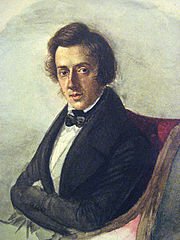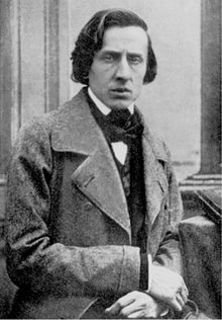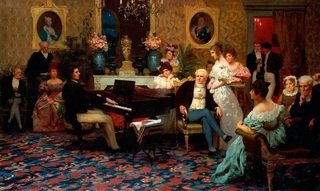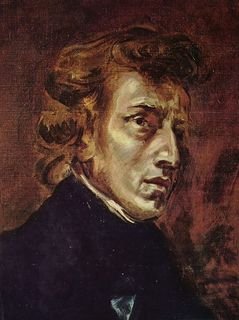Today is Frédéric Chopin's birthday, as many of you may or may not know. Chopin is best known for the piano music he composed, as well as the style of playing he created for piano. Here's a little bit about Chopin:

The Life of Chopin
Chopin was born on March 1st, 1810 in Żelazowa Wola (Duchy of Warsaw), Poland. From a young age Chopin was exposed to music when his mother and sister played the piano, as well as his father who played the flute. Chopin himself would begin to take piano lessons at the age of 7, after one year of trying to replicate the sounds he heard his family produce on the piano while he was young, and even starting to write his own music. Soon, however, Chopin would realize that he did not need a formal training to learn how to play the piano, and he left his teacher to train himself.

His abilities to both play the piano, and compose at a young age, caused him to gain a reputation as a child prodigy. As a result, he was often asked to perform at private soirées. At the age of 7, Chopin wrote his Polonaise in G Minor, which was printed.
At 16, Chopin was enrolled into the newly formed Warsaw Conservatory of Music, directed by Polish composer, Joseph Elsner, with whom, Chopin had studied music theory. Elsner insisted on traditional training, but also realized that Chopin had an incredible imagination that should not be altered by the demands of academics. Therefore, at the conservatory he took a solid course of instruction in aspects such as harmony and composition; while being given the freedom to develop a high degree of individuality in the way he played the piano.

Despite this, Chopin needed more experience in the field of music, so his parents found money to send him to Vienna (music capital of the world). It was here that Chopin would make his performance debut in 1829. Chopin would experience success, and on his return home would begin work on his Second Piano Concerto (completed 1829), and his first Piano Concerto (completed 1830). He would also write his first études at this time (1829 - 1832). These études would help him, and many others to master his new style of piano playing.
Chopin would move to Paris in 1831, from which he would never return to Poland. It was here that he met legends such as Franz Liszt and Gioachino Rossini (Yesterday's birthday article). He would later become close friends with Franz Liszt, and work on multiple compositions/performances with him.

In 1836, he would meet his love interest George Sand, whom he would move into a small Villa with. Eventually, Chopin's health began to decline when he got tuberculosis. When word of this reached the Villa owner, they were kicked out and had to move into monastery in the village of Valldemosa. Chopin's health would decline, and he would not write music (because he didn't have a piano) until in 1839 Chopin successfully recovered due to the successful work of a skilled surgeon.

After his relationship with Strand was strained by the recent marriage of one of Strand's children, Chopin became upset, as well as depressed about the revolution that broke out in Paris, France (1848). His health began to rapidly decline, and by 1849 he had died after returning to Paris. Chopin was buried at the cemetery of Père Lachaise.
Chopin left behind a legacy of piano music, as well as a new style of playing. Here are 10 of his compositions: (Thanks to my theory teacher for helping me to pick these out)
10 Compositions
10. Waltz in E-Minor
I first heard this piece performed at church by another piano player who is incredibly gifted. It sounds absolutely marvelous, and I actually heard it playing in a store the other day, and could not figure out what piece it was. I spent the afternoon listening to different piano pieces, and found that this was the piece. It is incredibly "flashy" (as in the piano player's hands look really cool, and I found that when analyzing this piece with my theory teacher, it is not as complex as it sounds theory wise. It has a lot of chromatic scales hidden in the music, that you never would have guessed were there.
9. Fantasie Impromptu
I included this piece on my list, 7 Exhilarating Classical Pieces You Should Listen to This Week, a few months ago. This piece is also incredibly showy, and demonstrates how good Chopin was at writing piano music (as well as the last one). It's incredible that Chopin can go from a fast, "showy" music, to a rather romantic theme that is not super complex, but very beautiful, without the audience realizing he's doing it until the transition is done. This piece is definitely one of my favorite pieces by Chopin!
8. Mazurka no. 37
I included this piece in my list, 7 Songs I've Been Listening to this Week in Remembrance of My Great Grandmother, I have still been listening to it almost every day. It still makes me think of walking at a brisk pace. It is absolutely beautiful, and I would definitely recommend it if you're stressed out. Chopin really was good at writing relaxing music, as well as exhilarating.
7. Ballade no. 1
In the beginning, this piece is very relaxing. But, as it goes, it grows in speed until it is extremely fast. It makes me think of rain, at first it drizzles, but then as time goes it begins to pour down hard, drenching everything. But, eventually the rain lets up, and leaves behind the rainbow, something beautiful, or in this case, a completed piece. Here is Chopin's first Ballade:
6. Military Polynaise
This piece, definitely sounds like an army could march to it. It sounds regal, yet elegant. This piece makes me think of the old British army in the times of the revolutionary war. They marched in orderly commons rather than hiding in their surroundings as modern soldiers are trained to do. I could imagine soldiers listening to this before going off to fight as inspiration.
5. Impromptu in G-Flat Major
This piece flows, which is why when I hear it, I envision a river flowing on a calm day with a steady pace. This could also represent having no worries (hakuna matata), soaring above your problems. I am definitely going to download this piece later, and would also recommend this to anyone looking for relaxing piano music.
4. Barcarolle
The left hand solo in the beginning is really cool. I like how he uses the left hand solo, and builds the right hand up on top of it, adding in a different melody, and keeping the left hand part the same as the solo for a while. Then he creates a more emotional theme from which he slowly creeps the left hand solo back in. This piece is also very relaxing!
3. Fantasie in F-Minor
When I listened to this piece I thought "Great, yet another relaxing piece by Chopin. . . " I'd like to point out that I always thought of fast piano when I think of Chopin, but many of the pieces my theory teacher recommended are relaxing. This piece sounds fairly simplistic in the beginning, then you get to the middle and it is sped up and sounds complex. One lesson to be learned from this piece, never judge a book by it's cover.
2. Sonata in B-Flat Minor
I included this piece in a list as well. This list was entitled 7 Piano Sonatas YOU Should Listen to This Week. This was actually one of the first pieces I ever heard by Chopin, and I had found it on my own. The third movement of this piece includes the famous "Death March," but my favorite movement is probably the first movement. The theme is catchy, and it is soooooo exhilarating. I would definitely recommend listening to this piece (unless you're trying to go to sleep). . .
1. Piano Concerto no. 2
Even though this piano concerto is entitled no. 2, it was actually the first of his piano concertos to be published. I know, confusing? (Almost like Star Wars going Episode 4, 5, 6, 1, 2, 3, 7, 8 :) I've decided to include this work first because it was probably one of the biggest projects he did (Chopin wasn't the best at writing music for orchestras). Chopin was actually featured as the soloist at the premiere of this piece. I decided not to include this piece in my list of 7 Piano Concertos You Should Listen to This Week because I was going to include it in this article.
Sources
Information
Images
Thanks for reading this! Chopin is definitely one of the greats, and it was fun to listen to pieces I'd already heard (and even some that I hadn't). Please let me know which piece was your favorite, and leave feedback. Catch ya' later!

Also remember to check for: My weekly 7 post, [Something else will eventually go into this space]!










